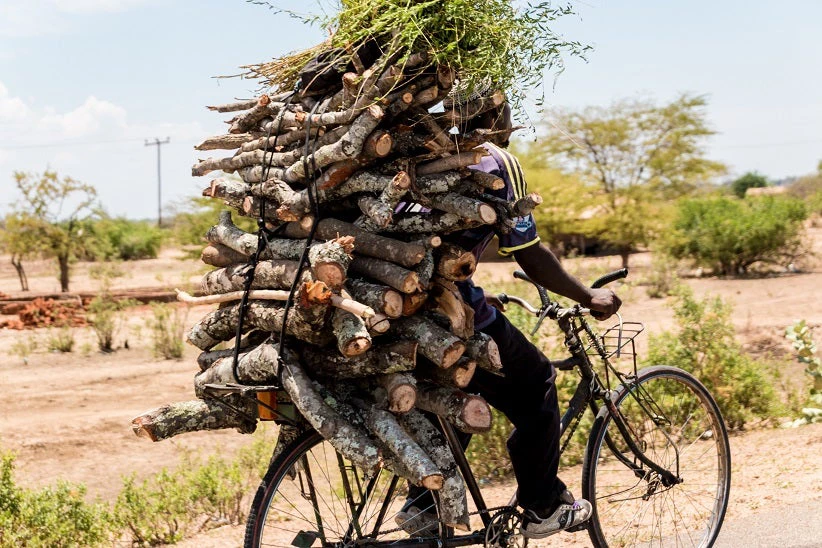
The jeep came to an abrupt halt, a few miles before we reached Lengwe National Park. I saw the Forest Officer jump out and stop a villager on a bicycle that was overloaded with a giant stack of firewood. The villager looked distraught as the Forest Officer confiscated the logs and sent him off with a cautionary warning. With a shrug of resignation, the officer explained that harvesting firewood in forest reserves and national parks was illegal and incidents like the one I had just witnessed were increasing tensions between the community and the Department of Forestry.
For many Malawians, firewood and charcoal provide their only source of income and for the majority, they are also the only form of energy (fewer than one in 10 people has access to electricity). Their economic predicament forces them to risk being apprehended but under these circumstances, they take their chances.
Forests account for 4% of Malawi’s total wealth and 7.5% of its natural capital (The Changing Wealth of Nations 2018). Still, Malawi lost over half of its natural forests between 1972 and 1992 – a rate of 2.5% per year. When forests are cut down, the resulting high rates of soil erosion adversely affect the water table which puts this already impoverished country into further economic and environmental stress. Additionally, losing forests affects the country’s biodiversity which is also under increasing threat of over-exploitation and illegal wildlife trade.
Environment Matters in Malawi
The incidence that I had just witnessed made me realize the vicious cycle of poverty and environmental degradation. As explained in the latest World Bank Country Environment Analysis (CEA) report, rapid population growth places huge demands on natural systems as more land is converted to agriculture and more forests are harvested for fuel. Climate change in the form of natural disasters and extreme weather events further strains this country’s degraded land and forests.
The World Bank has a long history of supporting the Government of Malawi to improve land and water management. Recent environmental projects have focused on the Shire River basin, the most prominent hot spot of land degradation in Malawi. The ongoing Shire River Basin Management Program (SRBMP) has helped the Department of Forestry to work with local community members to manage forests more sustainably under co-management concessions so that they have co-ownership of the forests and can find a means to survive without having to cut trees inside protected areas which puts them at risk. In six large forest reserves supported under this program, efforts of enhance forest protection and regeneration are underway. The results are promising and for the first time in many years, forest rangers and forest-dependent communities are now partners and not adversaries.
Investments in livelihood generation through enterprise development, wildlife conservation and combating illegal wildlife trade and logging are also some of the activities that have been implemented under the project. The video below showcases Lengwe National Park, which has faced intense deforestation and wildlife poaching. By supporting the development of small scale enterprises, strengthening community governance, and increasing resources for law enforcement, the environmental situation in the area has improved.
In June 2017, a $5.6 million grant led by the World Bank and funded by the Global Environment Facility (GEF), as a part of the Global Wildlife Program was integrated into the Shire Valley Transformation Project (SVTP), which adopts a landscape approach - an integrated method for sustainably managing land for multiple purposes and functions.
GEF funds will be used to engage communities to manage forests, protected areas and wetlands and encourage private sector investments through management concessions to fund park operations. By protecting wildlife, the project aims to promote nature-based tourism to increase the economic benefits that can be shared with communities which helps reduce human-wildlife conflict. Seeing firsthand the positive changes made by the project and by the people from the communities and the various Departments made me realize that although the challenges are enormous, people are open and willing to change their ways.
A sustainable path lies ahead
Malawi has taken bold policy and institutional reforms that could ease land degradation. For example, the recent National Charcoal Strategy (2017–2027) is an ambitious 10-year plan that promotes legalized charcoal value chains for climate-resiliency- where the government encourages people to apply for licenses to grow and manage their own forest areas allowing for the production, transport, and sale of charcoal to be regulated. With support from the World Bank and previously, the European Union, forest co-management plans that engage local communities would significantly increase sustainable wood production, reduce the tensions between the law enforcement agencies and communities and importantly, protect forest resources. Additionally, land reforms are boosting land tenure security and the government is making progress in taking wildlife crime seriously, promoting private sector investment in protected areas, and sharing tourism benefits with communities. All these efforts together with environmental education and awareness raising can help address some of the issues and transform the landscape to becoming more resilient.
Additional Resources:
The Shire River Basin Management Program website
The Country Environment Analysis of Malawi


Join the Conversation